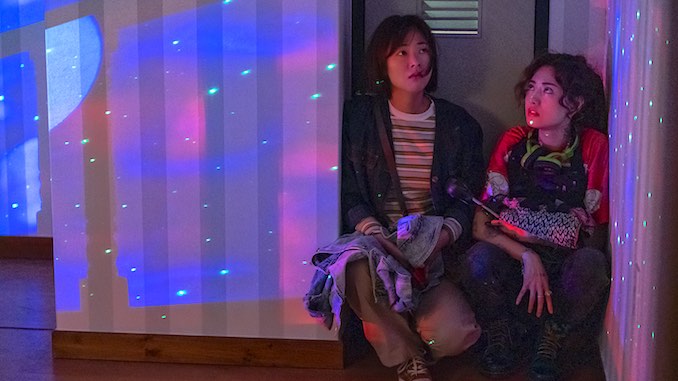Sci-Fi Series Glitch on Netflix Is an Admirable K-Drama Failure
Photo Courtesy of Netflix
Netflix’s latest K-drama offering, genre series Glitch—much like the conspiracy theories that drive its plot—is not what it initially appears to be. When we first meet thirtysomething Jihyo (Vincenzo’s Jeon Yeobin), she has a reliable job and a dependable boyfriend, but she’s sleepwalking through life, using most of her energy to pretend she doesn’t see aliens—or, more accurately, one alien in particular: a baseball helmet-wearing Little Green Man who looks like he just stepped off the backlot from X-Files episode “The Unnatural,” and who Jihyo has been seeing since ever she was a bespectacled, UFO-obsessed tween with a point-and-shoot camera. When Jihyo’s boyfriend, Sihyuk, disappears, our protagonist is pulled back into the obsession she thought she left behind.
It may be Sihyuk’s disappearance that drives the plot of Glitch, but it’s Jihyo’s relationship with childhood-friend-turned-stranger Bora (an effortlessly cool Nana) that centers the story. Back when Jihyo was a nerdy kid, she managed to find a kindred spirit in fellow loner Bora. For a time, they spent their free time researching UFOs together. When their friendship fell apart—in a sequence of evidence unspooled via intermittent flashbacks—Bora doubled down on the alien brand; now, she runs a UFO club and a streaming channel devoted to investigating the existence of life beyond our planet.
Stories about Little Green Men have mostly fallen out of fashion. In a post-Roswell, Battlestar Galactica, and My Love From My Star mediascape, most self-respecting pop culture aliens are humanoid (and are usually hot). They are excuses to ask the question “what makes humans human?” Because of this and because Glitch comes from an industry so damn good at the romance drama format, it’s notable that the series isn’t interested in following genre trends, alien-based or otherwise. This show is odd and unpredictable, centered around female friendship and religious, alien-worshiping cults. I tell you these things because, when I say the show is also kind of boring (at least in the first four episodes, screened for audiences at this year’s Busan International Film Festival prior to their Netflix premiere), I want you to know how much I still admire that it zigs when most TV shows are zagging.
What happened to Sihyuk, Jihyun’s boyfriend? Is Jihyo hallucinating or do aliens really exist? Glitch takes its sweet time answering these questions. This might not be an issue if it were more fun to spend time with these characters. It’s a good writerly instinct to structure Jihyo’s journey not around her relationship with Sihyuk, but rather Bora, a weird, vibrant character who has a much more interesting history with our struggling heroine. Glitch is at its best when it leans into this dynamic, but much of the first episode in particular is about Jihyo’s struggle to connect with the people around her. It’s important story-setting on a thematic level, but that only becomes clear in retrospect, and academically more than emotionally.
-

-

-

-

-

-

-

-

-

-

-

-

-

-

-

-

-

-

-

-

-

-

-

-

-

-

-

-

-

-

-

-

-

-

-

-

-

-

-

-








































